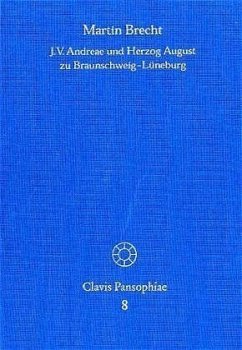Johann Valentin Andreae (1586-1654) caused quite a stir in his younger years as a reformer and writer. Until now, however, his late work has been little known. Research into Andreae's extensive literary legacy (preserved by the Herzog-August Bibliothek in Wolfenbüttel) has contributed to clarifying Andreae's manifold personas: he was an intense and versatile conversation partner to Duke August zu Braunschweig-Lüneburg; he was also a perceptive observer of the Thirty Year War, a connoisseur and collector of literature, fine arts and music as well as a book lover; but most importantly, Andreae was the leading figure of Lutheranism in southern Germany as well as a follower of Pietism as it was initiated by Johann Arndt. An analysis of this material adds a new dimension to the cultural, intellectual and Church history of the period.
Perlentaucher-Notiz zur F.A.Z.-Rezension
Der Theologe und Autor Johann Valentin Andreae und Herzog August waren enge Freunde - ohne sich in ihrem Leben auch nur einmal persönlich begegnet zu sein. Einzig in den in langen Jahren gewechselten Briefen sind sie sich nahe gekommen, ja so sehr ans Herz gewachsen, dass Andreae schon mal "mit Frohlocken und Kuss" grüßt und August keine Kosten und Mühen scheut, die vor allem pekuniären Probleme des Freundes zu lindern. Martin Brecht hat den Briefwechsel nun erstmals "im Detail" ausgewertet und verhilft dabei, wie der Rezensent Friedrich Niewöhner anerkennt, zu neuen Einsichten. Im Mittelpunkt stehe zwar die ungewöhnliche Freundschaft, nicht zuletzt aber erfahre man auch viele Details über die Spätphase des Dreißigjährigen Krieges in Baden-Württemberg: auch als "historische Quelle" ist der Briefwechsel also von Interesse.
© Perlentaucher Medien GmbH
© Perlentaucher Medien GmbH
»Martin Brecht's superb book is a fine example of diligent academic work. The vast material has been the most accurately structured, thus allowing the reader to gain profound insight into the complex historical circumstances of 17th century Germany and Andreaes eventful life.« Fast Review of Books in Renaissance Intellectual History »Despite Brecht's modesty, the book functions as an advertisement for the important but still largely unharvested yields for researchers waiting in the correspondence. [...] For a German academic book it is surprisingly light on footnotes and apparatus, and one wishes that Brecht's clear, concise prose style with compact sentences and interesting vocabulary were emulated by more of his peers. [...] Brecht's felicitous study will be attractive to all major research collections and particularly those focused on early modern theology, literature, and science.« Susan R. Boettcher, Sixteenth Century Journal

